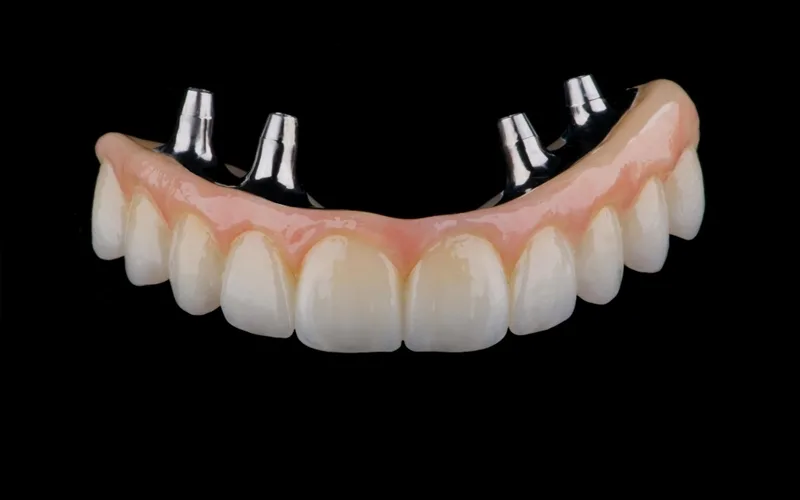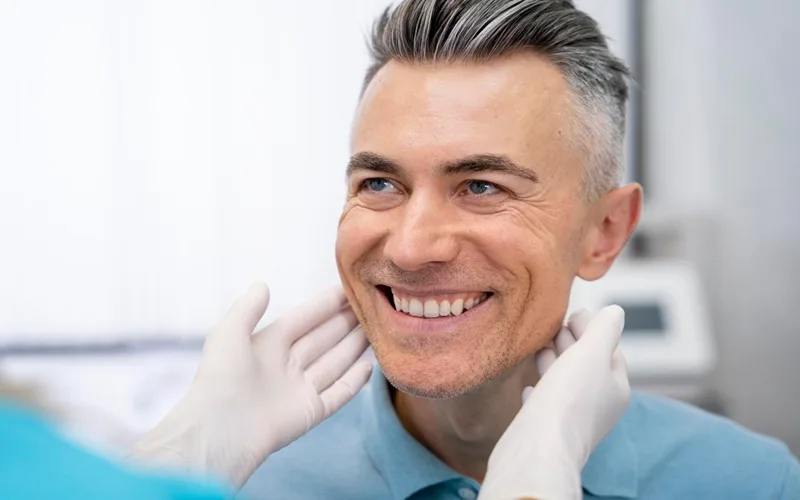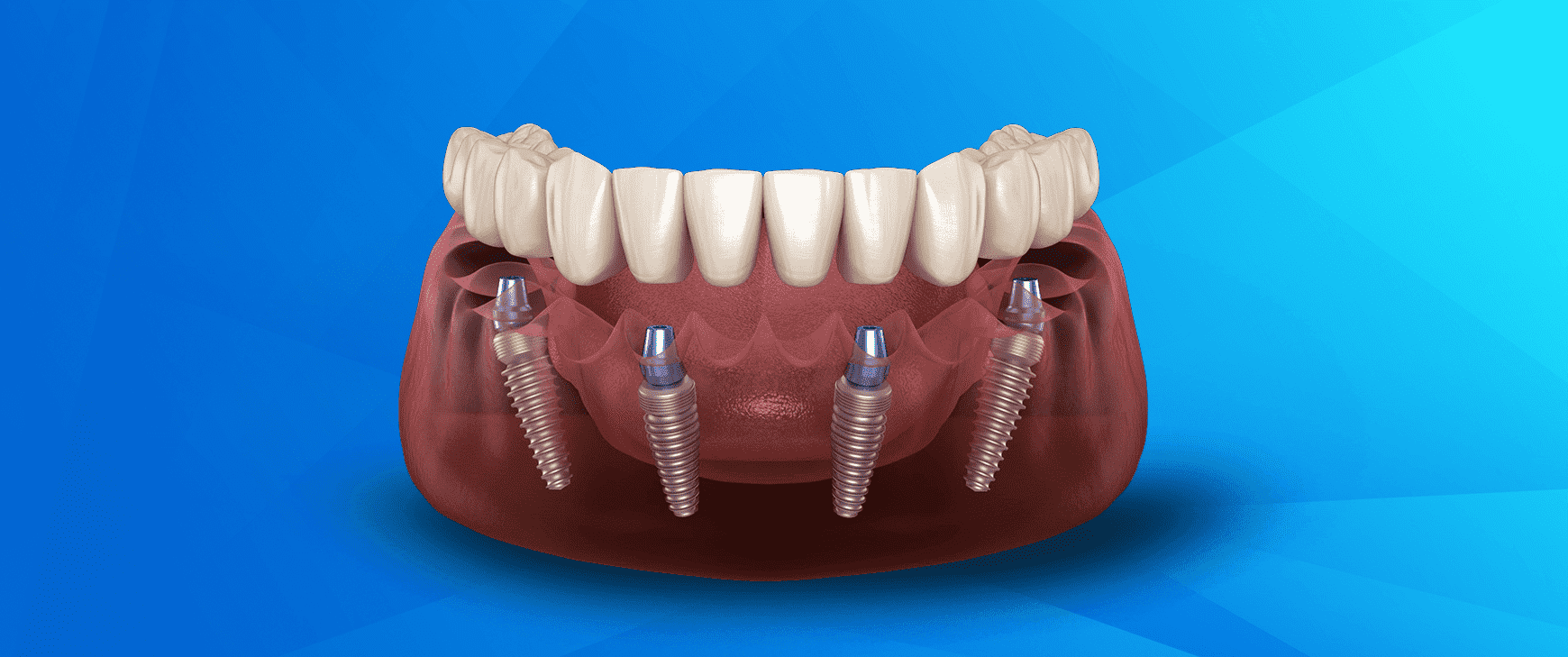What is an All on Four? How Is It Done?
Salih ÖNDER2025-04-01T17:54:06+03:00Table of Contents
ToggleIntroduction to All on Four Dental Implants
Tooth loss can significantly impact a person’s quality of life, affecting everything from self-esteem to basic functions like chewing and speaking. All on four dental implants have emerged as a revolutionary solution for individuals who have lost most or all of their teeth. By using only four dental implants to support a full arch of prosthetic teeth, this treatment provides a stable, long-lasting, and natural-looking restoration.
Unlike traditional dentures, all on four implants are fixed in place and do not slip or shift. They are designed to look and function like natural teeth, offering patients a more comfortable and confident smile. This technique is especially popular among patients seeking a faster and less invasive alternative to full-mouth implant procedures.
The All on Four Procedure: Step-by-Step Overview
The all on four procedure typically begins with a comprehensive dental examination, including X-rays or 3D scans to assess bone structure and oral health. Once the patient is deemed suitable, the treatment plan is customized to fit their specific needs.
During the procedure, four titanium implants are strategically placed into the jawbone—two in the front and two angled in the back for optimal support. Temporary teeth are often attached the same day, allowing patients to leave the clinic with a functioning smile. Over the following months, the implants fuse with the jawbone through a process called osseointegration. Once healing is complete, permanent prosthetic teeth are attached, completing the transformation.
Benefits of Choosing All on Four Dental Implants
All on four implants offer numerous benefits, making them a preferred choice for full-mouth restoration. One of the main advantages is the immediate improvement in aesthetics and function. Patients can walk out of the dental office with a complete set of temporary teeth on the same day as surgery.
This procedure also requires less bone density compared to traditional implants, which means many patients can avoid bone grafting. Additionally, all on four implants are easier to clean and maintain than removable dentures and provide better stability and comfort. Long-term, they help preserve jawbone health and prevent facial sagging caused by tooth loss.
Ideal Candidates for All on Four Dental Implants
All on four dental implants are ideal for individuals who are missing most or all of their teeth in one or both arches. Patients with sufficient jawbone density to support implants, or those who wish to avoid bone grafting procedures, are often good candidates for this treatment.
This solution is also suited for people who are dissatisfied with removable dentures or who want a more permanent, low-maintenance alternative. However, candidates must be in good general health and free from conditions that may interfere with healing, such as uncontrolled diabetes or severe gum disease. A thorough consultation with a dental professional will help determine if all on four is the right choice.
Comparing All on Four to Traditional Dentures

When deciding on a solution for extensive tooth loss, patients often weigh the pros and cons of traditional dentures versus all on four implants. While both serve the purpose of replacing missing teeth, there are significant differences between the two.
Traditional dentures are removable and rest on the gums, often relying on adhesives to stay in place. Over time, they can become loose due to bone loss in the jaw, which may lead to discomfort or embarrassment during eating or speaking.
All on four implants, on the other hand, are fixed in place and anchored into the jawbone. This provides a stable and secure fit without the need for adhesives. The implants stimulate the jawbone, helping to prevent bone resorption, which is a common issue with dentures.
Key differences include:
Stability: All on four offers a secure, non-removable solution.
Comfort: Implants reduce gum irritation and discomfort.
Bone preservation: Implants prevent bone loss while dentures do not.
Maintenance: Dentures need to be removed and cleaned daily; all on four can be brushed like natural teeth.
Longevity: All on four is designed for long-term use, often lasting decades with proper care.
Post-Procedure Care and Maintenance
Proper care after receiving all on four implants is essential for healing and long-term success. Immediately following the procedure, patients should follow their dentist’s instructions closely to avoid complications.
Initial care may include:
Eating soft foods for the first few weeks
Avoiding strenuous activities during early healing
Taking prescribed medications to manage pain or prevent infection
Keeping up with follow-up appointments for monitoring
Long-term maintenance includes:
Brushing at least twice a day with a soft-bristled toothbrush
Using a water flosser or special interdental brushes to clean around the implants
Attending regular dental check-ups for professional cleanings and evaluations
Patients who maintain good oral hygiene and follow their dentist’s advice can enjoy the benefits of their all on four implants for many years.
Potential Risks and Complications
Like any surgical procedure, the all on four implant treatment carries some risks, although complications are relatively rare when performed by experienced professionals.
Common risks include:
Swelling or bruising at the implant site
Minor bleeding or discomfort during the first few days
Temporary speech or chewing difficulty during adjustment
Less common but more serious complications:
Implant failure due to poor bone integration
Infection if post-operative care is neglected
Sinus issues for upper implants, especially if bone height is insufficient
Most complications can be minimized or avoided entirely with proper planning, a skilled dental team, and attentive aftercare.
Success Rates and Longevity of All on Four Implants

All on four implants are known for their high success rate and long-term durability. Clinical studies show that the success rate for this treatment is around 95 percent or higher, even after 10 years of use.
The longevity of all on four implants depends on several factors:
The quality of materials used in the prosthetic
The precision of implant placement
The patient’s oral hygiene and lifestyle habits
Regular follow-up visits and professional cleanings
With proper care, all on four implants can last 15 to 20 years or more. In many cases, only the prosthetic teeth need to be replaced after a certain period, while the implants themselves remain securely integrated with the jawbone.
Cost Considerations and Insurance Coverage for All on Four in Turkey
Turkey has become a leading destination for dental tourism, particularly for procedures like all on four. One of the most attractive reasons patients choose Turkey is the significant cost savings compared to countries like the UK, USA, or Canada.
The average cost of all on four in Turkey ranges from $4,000 to $7,000 per arch, depending on:
The dental clinic’s reputation and location
The type and quality of materials used (e.g., zirconia vs. acrylic)
Whether the price includes accommodation, airport transfers, and other travel-related services
Despite the lower costs, many Turkish clinics meet or exceed international standards of care, offering state-of-the-art technology and experienced professionals.
As for insurance coverage, most international and local insurance plans do not cover cosmetic dental procedures like all on four. However, patients may receive partial reimbursement if the implants are deemed medically necessary. It’s important to check directly with your insurance provider for detailed information before traveling.
Patient Testimonials and Case Studies
Many patients who undergo all on four in Turkey report high levels of satisfaction with both the results and the overall treatment experience. Testimonials often highlight:
Life-changing aesthetic improvements
A boost in confidence and comfort
The convenience of having a new smile in just a few visits
The professionalism and hospitality of Turkish dental teams
Case studies frequently show dramatic transformations, even in patients with advanced tooth loss or severe bone recession. These stories serve as powerful examples of how all on four can restore not just oral function, but quality of life.
For your information –> All on Six
Advancements in All on Four Implant Technology
Recent years have seen significant innovations in implant dentistry, and all on four is no exception. Modern advances are making the procedure even more effective and accessible.
Some notable developments include:
3D imaging and digital planning tools for highly accurate implant placement
Improved implant materials with better biocompatibility and strength
Immediate loading techniques that allow temporary teeth on the same day
Custom-designed prosthetics for enhanced fit and aesthetics
These technological improvements mean faster recovery times, increased comfort, and better long-term outcomes for patients opting for all on four.
It might interest you –> Dental Implants Turkey
Frequently Asked Questions (FAQs) About All on Four Implants
Here are answers to some of the most common questions from patients considering all on four:
Is The Procedure Painful?
The surgery is performed under local anesthesia, and most patients report only mild discomfort afterward, similar to a tooth extraction.
How Long Does The Entire Treatment Take?
From consultation to final placement, the process can take anywhere from a few days to several months, depending on whether healing time is needed between steps.
Can I Eat Normally With All on Four?
Yes, after the final prosthesis is placed, you can eat most foods without restriction. During the healing phase, a soft diet is recommended.
Are There Age Limits For This Procedure?
There is no upper age limit. As long as you are in good general health and have sufficient jawbone, you may be eligible.
Will People Notice I Have Implants?
All on four implants are designed to look natural. Most people won’t notice you’ve had dental work unless you tell them.
Click and learn –> Hollywood Smile Turkey
2-3
Now
10 Days
Now
Local anesthesia
5 Years
Non
2 Hours Later
Note: *The information and recommendations on this page are for informational purposes only. Please consult your doctor for diagnosis and treatment. WhatsApp line.
Bütün İşimiz Diş


